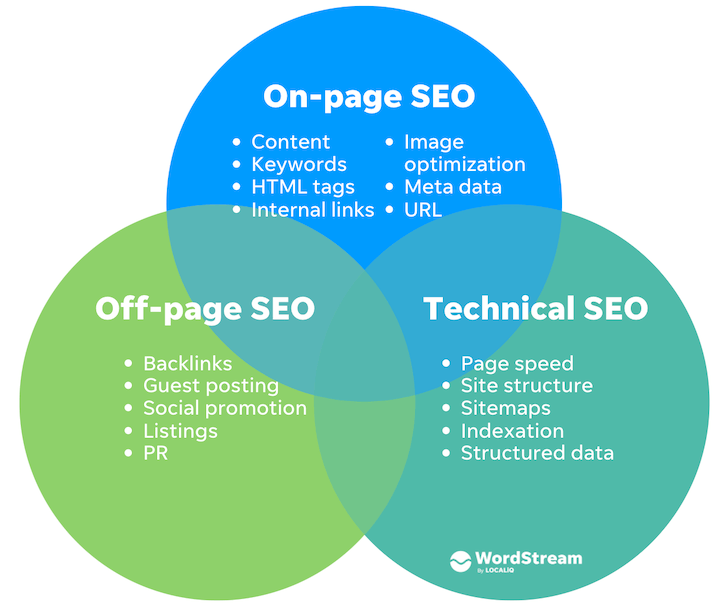Imagine skyrocketing your website’s traffic and seeing a return on investment of 13 times your initial spend. This isn’t a fantasy—it’s the reality for businesses that master SEO. Forbes highlights the undeniable power of effective SEO strategies. If you’re ready to transform your online presence and drive real, tangible results, this guide will show you how to harness the power of SEO and make your website work for you. Let’s get started on SEO for beginners- your crash course to having a successful SEO strategy for your small business!
What is SEO?
Search Engine Optimization (SEO) is the practice of enhancing a website to improve its visibility in search engine results pages (SERPs). When users search for keywords relevant to your business, a well-optimized site will rank higher, attracting more organic (non-paid) traffic. SEO involves a combination of on-page, off-page, and technical strategies to make a website more appealing to search engines like Google, Bing, and Yahoo.
Why is SEO Important?
SEO is crucial for several reasons:
- Increased Visibility: Higher rankings in SERPs mean more visibility and traffic to your site, which can lead to higher sales and growth.
- Credibility and Trust: Users tend to trust websites that appear on the first page of search results, as they see these sites as more credible and authoritative.
- Better User Experience: Good SEO practices improve the overall usability and user experience of your website, making it more engaging and easier to navigate.
- Cost-Effective Marketing: Unlike paid advertising, organic traffic generated by SEO is free. Once you rank well, you don’t have to pay for each click or impression.
- Competitive Advantage: Effective SEO can help you stay ahead of competitors by ensuring your website ranks higher for relevant keywords, attracting more customers.

SEO Basics to Make Sure Google Indexes Your Site
Ensuring Google Indexes Your Site involves several key steps:
- Create and Submit a Sitemap: An XML sitemap helps search engines understand your site’s structure and find all your pages. Tools like Yoast SEO for WordPress can generate a sitemap for you.
- Use Robots.txt Wisely: This file guides search engines on which pages to crawl and which to ignore. Ensure your robots.txt file allows search engines to access important pages.
- Check for Crawl Errors: Use tools like Google Search Console to identify and fix any crawl errors. Regularly monitor your site to ensure all pages are being indexed correctly.
- Optimize Your URLs: Use clear, keyword-rich URLs that describe the content of each page. Avoid using special characters and unnecessary parameters.
- Ensure Mobile Friendliness: Google prioritizes mobile-friendly websites, so ensure your site is responsive and offers a good user experience on all devices. Use Google’s Mobile-Friendly Test to check your site.
- Improve Site Speed: Fast-loading sites are favored by both users and search engines. Use tools like Google PageSpeed Insights to identify and fix performance issues, such as compressing images and minimizing code.
This is a critical step for all SEO for beginners. It is critical that Google knows your site is out there and that it has good information. We have a fantastic post on creating content at scale using AI and ChatGPT for you to read here.
What is Keyword Research?
Keyword research is the process of identifying the words and phrases that people use to search for information online. It is a critical component of SEO because it helps you understand what your target audience is looking for and how to address their needs.
Steps in Keyword Research:
- Brainstorm Seed Keywords: Start with broad terms related to your business. Think about what your customers might be searching for.
- Use Keyword Research Tools : Tools like SEMrush , Google Keyword Planner, and Ahrefs can provide valuable data on search volume, competition, and keyword suggestions. They can help you find relevant keywords and assess their potential.
- Analyze Competitors: Look at the keywords your competitors are ranking for. Tools like Ahrefs can show you which keywords are driving traffic to your competitors’ sites.
- Focus on Long-Tail Keywords: These are more specific phrases that often have lower competition and higher conversion rates. For example, instead of “shoes,” target “women’s running shoes size 8.” Long-tail keywords can help you attract more qualified traffic.
Why is Keyword Research Important?
Keyword research is crucial because it helps you identify the terms your target audience uses to find information related to your business. By understanding these keywords, you can create content that directly addresses users’ needs and queries, improving your chances of ranking higher in search results.
Mind Your Business Newsletter
Business news shouldn’t put you to sleep. Each week, we deliver the stories you actually need to know—served with a fresh, lively twist that keeps you on your toes. Stay informed, stay relevant, and see how industry insights can propel your bottom line.
Subscribe to Mind Your Business
Keywords play a crucial role in both on-page SEO, incorporated into title tags, meta descriptions, headers, and content, and off-page SEO, used in anchor text for backlinks and brand mentions.

What is On-Page SEO?
On-page SEO refers to optimizing individual web pages to rank higher and earn more relevant traffic. It involves both content and HTML source code optimization.
Key Elements of On-Page SEO:
- Title Tags and Meta Descriptions: Craft compelling and keyword-rich title tags and meta descriptions. Title tags should be concise and include primary keywords, while meta descriptions should summarize the page content and encourage clicks.
- Header Tags (H1, H2, H3): Use header tags to structure your content and include relevant keywords. H1 tags are for main titles, H2 for subheadings, and H3 for further subdivisions. Proper use of header tags improves readability and SEO.
- Content Optimization: Write high-quality, engaging content that provides value to users. Use keywords naturally and focus on keyword density, ensuring your content is informative and relevant.
- Internal Linking: Link to other relevant pages on your site to help search engines understand the structure and context of your content. Use descriptive anchor text that includes keywords.
- Image Optimization: Use descriptive file names and alt text for images to help search engines understand your visuals. Compress images to improve load times and enhance user experience.
- URL Structure: Create clean, keyword-rich URLs that clearly describe the page content. Avoid special characters and unnecessary parameters.
What is Off-Page SEO?
Off-page SEO refers to actions taken outside your website to impact your rankings within SERPs. It primarily involves building high-quality backlinks from reputable sites.
Key Strategies for Off-Page SEO:
- Backlink Building: Earn backlinks from high-authority sites through guest posting, influencer outreach, and creating shareable content. Focus on quality over quantity.
- Social Media Marketing: Promote your content on social media platforms to increase visibility and attract backlinks. Engage with your audience and encourage sharing.
- Local SEO: Optimize your online presence for local searches by claiming your Google My Business listing and earning reviews. Ensure your NAP (Name, Address, Phone Number) information is consistent across all platforms.
- Brand Mentions: Encourage mentions of your brand on other websites and forums to boost your online reputation. Monitor and respond to mentions to build relationships and improve visibility.

5 Common SEO Mistakes to Avoid
- Keyword Stuffing: Overloading your content with keywords can lead to poor readability and penalties from search engines. Focus on natural, relevant keyword usage to maintain a positive user experience.
- Ignoring Mobile Users: Failing to optimize for mobile can result in a poor user experience and lower rankings. Ensure your site is mobile-friendly to capture the growing number of mobile users.
- Neglecting Technical SEO: Overlooking technical aspects like site speed, structured data, and crawl errors can hinder your SEO efforts. Addressing these factors is crucial for maintaining a high-performing website.
- Buying Backlinks: Acquiring low-quality backlinks can result in penalties. Focus on earning organic, high-quality backlinks to build a strong, reputable link profile.
- Duplicate Content: Duplicate content confuses search engines and can lead to lower rankings. Ensure all content on your site is unique and valuable to improve your SEO and user experience.
Wrapping up SEO for Beginners
SEO may seem overwhelming, but understanding and implementing these basics can significantly improve your website’s visibility and performance. By focusing on keyword research, on-page and off-page SEO, and avoiding common mistakes, you can build a strong foundation for your SEO efforts. Remember, SEO is a long-term strategy that requires continuous learning and adaptation to stay ahead in the ever-evolving digital landscape.
Ready to take your SEO to the next level?
Let our team of experts help you achieve higher rankings and drive more traffic to your website with our SEO Services for Small Business. Contact us today to learn more about our comprehensive SEO services and how we can tailor a strategy to meet your business goals. Get started with SEO for beginners and watch your online presence grow!
By following these SEO basics and continuously optimizing your website, you can improve your search engine rankings, drive more traffic, and achieve long-term success in the digital landscape. Whether you’re a beginner or looking to refine your skills, understanding and implementing these SEO optimization basics will set you on the path to becoming an SEO expert.






